[DISPATCH] once bitter, twice shy
on the depth of women and whether I will leave Colombia early
Much like Jesus, dispatches to home has risen from the dead. Yes, I’m two (or eleven) days late, but God’s timing is always right! A belated happy Easter and feliz pascuas to those that celebrate. Click on the title to read this newsletter in full.
Ladies, Ladies, Ladies
In the vein of Saoirse Ronan and her Accent by way of Louise May Alcott, I spend a lot of time considering women. Anyone who has ever done DEI work is familiar with salient identities — basically, the concept of which aspect of being is most apparent, most visible in any given space. I felt that the point of the exercises was to understand the contexts our identities show up in as well as understand how we have come to define ourselves through the experiences we have due to them. In college, I considered my status as a first-generation, low-income student as my most salient identity because of how alienated I was from classmates with families who summer in the Alps or luncheon with the president of some obscure organization. Some days, my Blackness was my most salient identity because a student had mistaken me for a sanitation employee. On others it was my cis womanhood because I couldn’t decide whether I’d had a shitty night or been sexually assaulted. Our environments demand. The spaces we occupy reveal who we are by way of how we interact with them — pertinent questions being am I here because I’m treated well, am I here because I’m not treated well and it’s all I know, am I valued here — and how people perceive us and how we respond to stimuli we can’t control. Colombia, a new environment, introduced me to unexplored depths of my identities. This month in particular, I’ve discovered new depths through conversations with women who are completely different from me. Some anecdotes from my month of obsessing over women:
On lonely Friday, I went to mass. Well, I thought it was mass. And I was hoping it was mass because I planned on eating a chicken sandwich within 45 minutes. Slowly, I came to realize that it was Via Crucis, a two-hour devotion mini-pilgrimage that commemorates Jesus Christ's last day on Earth as a man. Intimidated by belief and tradition, I sat in the back, ready to experience something outside of my expertise. Out of nowhere, one of my fourth graders sat down beside me. A few seconds later, I noticed two more of my fourth graders in the pew behind. Waiting for service to start, they subtly wiggled and scooted to me until we were all pressed together. Throughout the fifteen devotions, the girls stuck to me like chicle; They kneeled as I kneeled, stood when I stood and walked where I walked. I quickly realized that I had to be a good Catholic role model for them even though I’m not Catholic. At first, their attachment made me anxious. My brain went into overdrive trying to figure out how to escape and eat my damn chicken sandwich when a lost memory returned to me. When I was seven, I attended my first funeral. I didn’t know the deceased nor their family, so I often found myself underfoot the woman who brought me. My next-door neighbor, Denise was a chain smoker obsessed with Pepsi who taught me to worship The Golden Girls and how to use sour cream to achieve the perfect fluffy eggs. I was searching for juice after the wake when I overheard someone tell Denise — truthfully, the closest thing I had to a mother at the time — how annoying and needy I was. Sure and prompt, I turned around to finish Lemony Snicket’s The Grim Grotto and cry alone. On the spot, my seven-year-old self decided to never bother anyone with how much I needed them, a decision that means I now always have to work double time to show people that I love and care for them. I doubt I’m the only woman with a traumatized inner child. It’s no secret we have to shrink ourselves in order to be accepted, but I constantly find myself wondering how early we learn that.
International Women’s Day is a huge thing in Colombia. That Wednesday, I woke up to nearly a hundred texts wishing me feliz día de mujer. At school, I drowned in gifts. I, not having known how big of a deal it was in Colombia, felt terrible when my female coworkers gave me handmade cookies and loaves of sweet bread. Our institution celebrated — male students and teachers in charge — with feminist poems and awards and holding elections wherein only women won before dancing away in the afternoon. Initially, I assumed that the day’s grandiose nature was due to the fact that Colombia has more national holidays than any other country. (Colombians love to party.) However, when Men’s Day came around — March 19 — it was a muted affair. We didn’t even have an assembly, everyone just went to the polideportivo for an all-day soccer tournament after the first two hours of class.
My film club has started in earnest. Initially, had a very specific, very ambitious vision for this club: Socratic seminars and partnerships with Cine Colombia and virtual chats with indie filmmakers. While I still aspire toward this unhinged goal, what I have in its place is a development beyond imagination. Every Saturday morning, I corral 15 little girls — ages ranging from 4 to 10 — who can’t read with attention spans shorter than celebrity marriages into learning English. I fell into this arrangement by happy accident. In my town, there’s a woman who runs an arts and craft workshop out of a converted hotel. (With the help of the girls, she painted upwards of two hundred egg cartons to refurbish the roof.) In December, I started learning how to crochet from her daughter. Conversations built on each other and it turned out that the workshop owner used to teach film analysis and photography so I casually mentioned that I wanted to start a movie club for learning English. Even though their parents consider the space a post-elementary daycare, the workshop is really more of a vulnerable community. The girls are so animated and ferocious and all know exactly what they want. They push each other’s buttons, they apologize, they dress up like aliens and perform, they rip their clothes, they argue and laugh and scream and dance and run barefoot. Already, these girls are formed to an extent that I actively envy them. They ask me profound, soul-searching questions before belching and jumping into the ball pit. Watching them develop in a safe space makes me mourn that I never had something similar. Still, I feel grateful to be able to facilitate activities for their growing minds and it feels that I am sort of healing something fractured within. I often catch Juli, who has barely turned four, deep in thought, analyzing the situation at hand. When this happens, we observe each other idly, a secret smile passing between when the demands of life pull us away.
A few months ago, I made it a goal to make more female friends in Colombia. This is hard for a variety of reasons, a prominent one being that I do not care about my appearance as much as some would like me to. (Apparently, my host mom’s coworkers spend a lot of time demeaning my clothes.) Anyways, as a part of this goal, I invited one of my adult students out for a tinto under the guise of practicing English. Often I find myself terrified of one-on-one interaction, so much so that I will only accept invitations if I know there’s more than three people in attendance. I went and only mutilated my pinky finger in the hour before another of my adult students showed up. She had turned thirty and couldn’t stop crying. She got married at 19 and suffered through an intense, life-threatening birth when she was 21. Within 30 minutes, she cycled through bitterness, euphoria, devastation and gratitude. Relying on nothing but the fact that we wanted to spend time together, the three of us discussed police brutality in Bogota, public university strikes, fallen comrades, men and their incompetence, privilege, travel, language exchange. I felt alive. I felt like I was having a conversation and people were listening to me and considering how they felt about what I said. They were engaged, finishing my sentences and slamming their fists on the table. They were not, like many of the men I interact with in Colombia, nodding their heads and imagining the shape of my breasts or counting down the seconds until it wasn’t rude to interrupt. Over beers and french fries, we were judgmental nanas, squawking hens, young kids with no clue what would come tomorrow. We were women in different walks of life, meeting each other at our crossroads to compare experiences before moving on.
A Another Visual Month
March, much like the diarrhea I’ve had four weekends in a row, ran through me with efficiency. I can’t remember the last time I slept seven hours — or even well for that matter — but I have a handle on things. As a year of living in Colombia approaches, I realize that I am feeling settled and sure of myself for the first time in a long time.
I’ve expanded the OÍSTE staff from two to eight in preparation for our April issue, filling each position with the ideal candidate. After our first all-staff, I vibrated for hours as ideas and goals I previously thought impossible unveiled themselves simple step by simple step. I have my modest film club — so far, the most successful class featured Avatar: The Last Airbender. I started project managing a radio program to promote English learning in Boyacá, Colombia and I co-host every fourth Tuesday of the month (we’re on every week at 1pm CT!). There’s another adult class on my schedule; we started with eight students and now we’re 30. A very excited 30! I guest hosted two episodes of NPR’s New Music Friday, gushing about great releases from T-Pain, 100 gecs, Chlöe and boygenius.
This is all to say I’ve been flying by the seat of my pants, snapping a pic when I can to remember where I’ve been. Here are some of my favorites of the month.

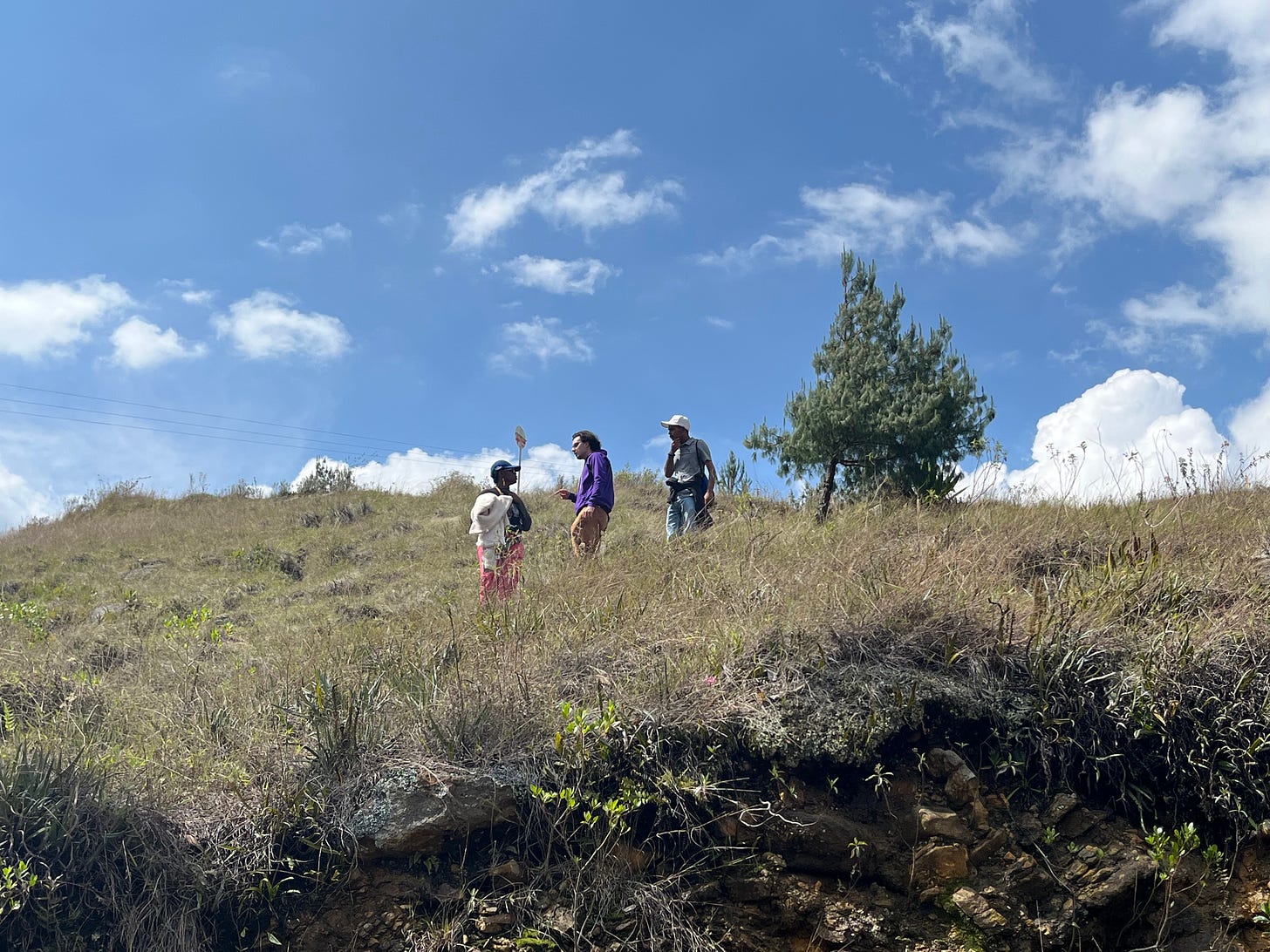
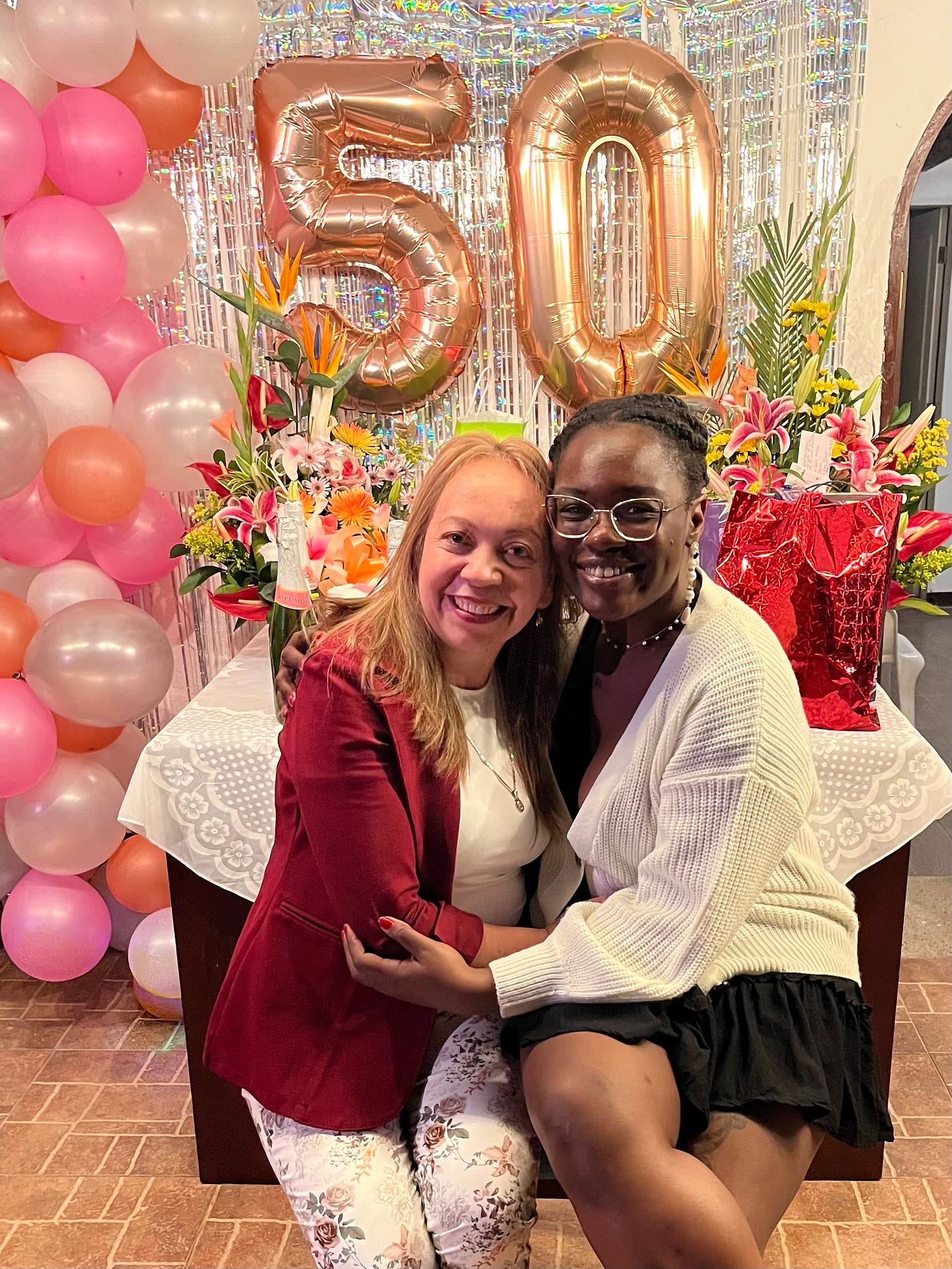
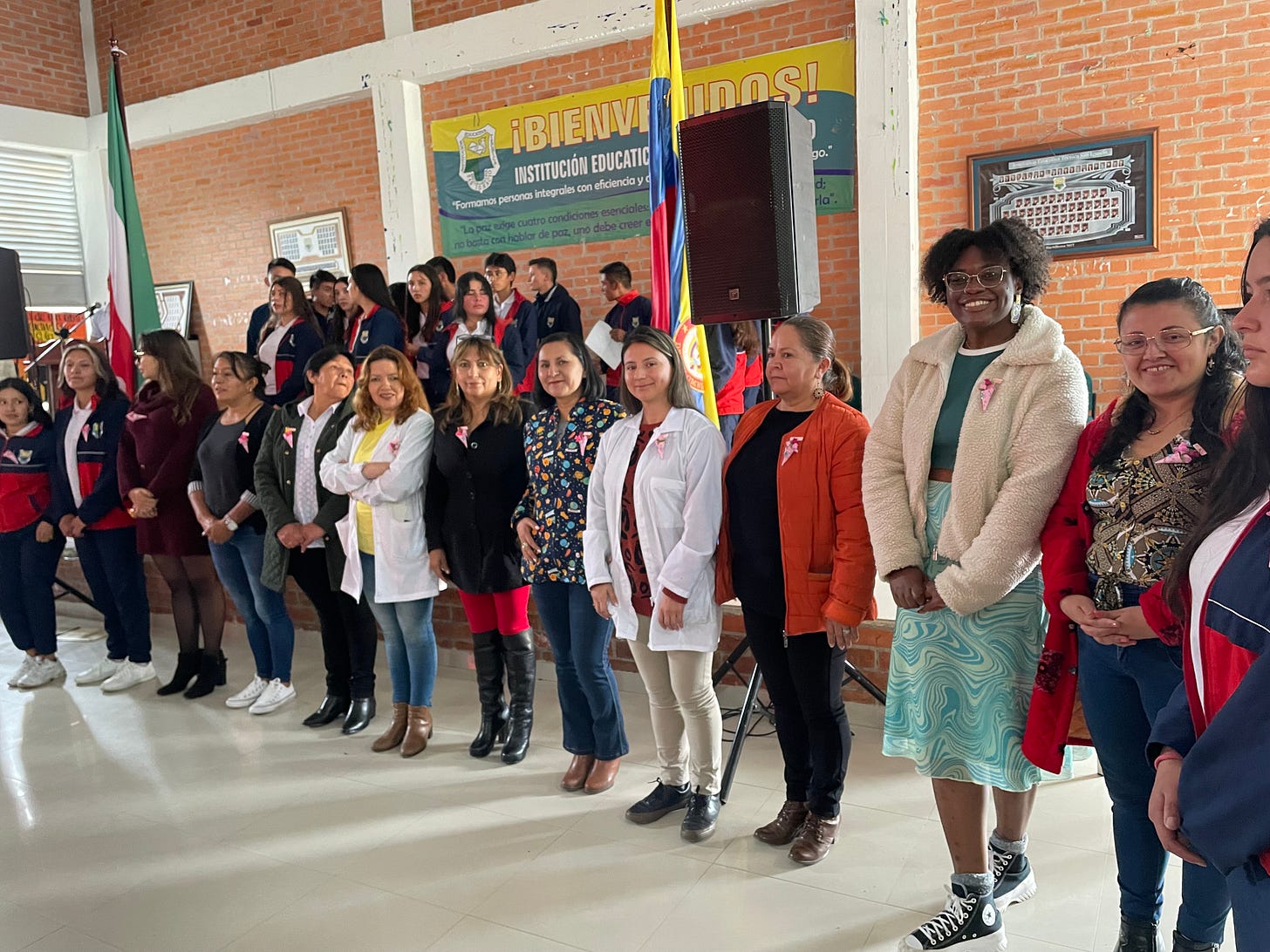
The Final Tall Black Girl / If At First You Don’t Succeed
I have been an arrogant bitch1 since I was five years old. If we put aside my skin color, I have to admit I’m at a loss to understand why. My smile is enchanting. A big fan of gaudy combinations like mustard yellow and hot pink, I dress myself like a toddler. My laughter fills a room (really, I’ve been told it's obnoxious and am frequently being shushed). I make more space for others to show up than I do for myself. When Lorenzo and I chatted about these feelings on a long hike, he said, “You’re literally always smiling. In the year we’ve known each other, I have only seen you upset — not even angry, just upset — once.” Yet, in Colombia both Americans and Colombians regard me as a distempered, quick wick firework. When everyone tells you who you are — especially when it's a negative perception — it’s hard not to take it to heart. Thus, I spent half of March wondering how to be nicer, more amenable. I found that I only became smaller and less present.
Am I a bitch? Probably. I certainly have high standards that I barely live up to. My worst qualities concern my impatience and demanding nature. A better truth may be that I’m not allowed to have expectations. In my group of colleagues, I share a similar disposition — straightforward, witty, thoughtful, creative, opinionated — as a white man and a white woman. Where I am bossy, the white man is a leader with initiative. Where I am abrasive, the white woman is quirky and tells things like they are. They are adored while I am feared, too unapproachable to have a conversation with. I wonder if people consider me above reproach, instead preferring to discuss behaviors of mine they dislike with anyone but me. Recently, I left a bar because I had to get ready for class and the next morning my counterpart apologized profusely. When I asked what he was apologizing for, he said he was sorry for making me angry. As it turned out, he and my site mate assumed I was upset about something and stormed off in retaliation. Instead of reaching out to me, they decided amongst themselves how to handle me. As if I was a rabid animal. Yes, there is a fountain of primal rage within, but it’s not thoughtless. Centuries ago, Europeans decided that brown skin was inferior. Today, me and my people continue to suffer at institutional and intimate levels. On top of that suffering, we endure gaslighting over what can and can’t be classified as racism. For two decades, I acclimated to the racism in the United States — avoid cops, be polite to white people, work twice as hard for half the successes. Here, allegedly, Colombia is “race blind.” Even though numerous Colombians tell me that race isn’t something they think about and that it doesn’t exist here because of their Mulatto heritage, I find myself more aware of my Blackness than I ever was back home. I’ve started to hate fundamental parts of myself only because they other me in a way they don’t in the United States.
Whatever I am, I feel that I am a disrespected one. And therefore my projected bitchiness is probably warranted. Sometimes I feel that I have to be the bitch because it’s all I’m good for. A piece of gossip on a slow day. A story with screenshot fodder. A neo-noir in which there is absolute good and absolute bad and I am the one holding the smoking gun. I tire of these realizations. Once, Soledad told me that her husband, who was raised in Guyana before moving to Georgia as a teenager, used to be angry and bitter. It was only after they married that he learned how to let racist aggressions, whether micro or macro, roll off him. As one of a few Black men in buck fuck Georgia, resignation became the only way to survive.
The final girl is a trope often employed in horror films — especially slashers — that refers to the last female survivor. Through a privilege of moral purity (the final girl is the only one of her friends who refuses sex or drugs or underage drinking), she either escapes or confronts the narrative’s villain in a final stand off. She can be saved by someone else or plunge the knife herself. She has a past trauma that is exacerbated by the narrative’s plot. The final girl that everyone knows is Sidney Prescott from the Scream franchise.2 Sidney transformed the final girl trope into something more progressive3 as its origins granted survived through luck — Jamie Lee Curtis in 1978’s Halloween, for example — where now the final girl’s status is better associated with her cunning tenacity and persevering deduction. In other words, the final girl has to learn the rules of the game if she wants to get to the end.
Halfway through March, I had to decide whether I wanted to be the final Black girl.4 the only other Black woman in my cohort left suddenly, saying that she couldn’t handle daily experiences with racism anymore. I overheard one of my bosses discussing her departure with “I never expected her to last.” We were the only two experiencing Colombia through the same marginalized identities. Even though we never discussed it with each other, I felt alone after she left. I became touchy and sullen. She was brave enough to jump ship. Am I foolish enough to smile through it? The final girl does not have it easy. She is constantly fighting, clawing her way to freedom. Even worse, the concept of the final Black girl in slashers — for obvious reasons — remains largely unexplored. I have very little to work with, building the path to survival mistake by mistake. While it’s entertaining media, the plight of the final girl becomes a traumatic process, one of decomposition and decay, when applied in real life. My breaking point came when a taxi driver overcharged me in Bogotá. At first, I was just annoyed because this is more of a gringa than negrita thing. Then, after someone in my host family scolded me instead of listening to my frustrations, my timid 50/50 stance on whether I should leave Colombia turned into a strong 70/30 yes.
Over text, I spilled my guts to Vic. It was the first time I said what I had been considering out loud and it scared the shit out of me. I cried the whole night, wallowing in failure and disappointment.
In the morning, I committed to having one carefree day with the family before I made any decisions. We had breakfast at a French café where I taught Ron and Sharon about orgasm manifestations. We rode the cable car over La Candelaria. We traipsed in and out of museums. We got separated and argued in the rain over where to eat. After Soledad told me she felt something in the air, Ron bought me a new deck of cards (Rider–Waite in Spanish) and in a restaurant fittingly called La Bruja, I pulled cards at random, pretending to be in the midst of a reading while posing for Soledad’s camera. When I looked at the four cards in front of me, I swore they were telling me to go home. Unnerved by their confidence, I snapped a quick picture and resolved to revisit the unexpected message later.
In the first position, a figure in black mourns. Afflicted by tragedy, this person can do nothing but fixate on the three spilled cups in front of them. An obsession card, the 5oC represents narrow-minded pessimism despite other abundant opportunities. Obviously, this represents my feelings of dissatisfaction. Constantly, I am wondering why I am so unhappy with a decision that I thought would change my life for the better. (I mean, at least provide a change of scenery other than the one that led to a deep two-year depression.) In the second position, the 4oC shows a man lost in thought, once again fixated on three cups. Though the cups are filled and upright here, the man still seems unhappy and unfulfilled. Out of thin air, another cup arrives to present a new opportunity. The question is whether the man will seize it. The 4oC is an invitation to bring attention inward and re-evaluate situations in order to find meaning in what you do. The querent may have found themselves disconnected from their inner truth and emotional self. I understood this card as calling me to realize that my values don’t always align with the mission of my organization. Even more so, I need to strengthen my connection to my own principles for a greater sense of purpose. (On an intimate level, this would be telling people to stop calling my hair ugly even though my employers discourage that. On an institutional level, this would be quitting altogether and using my skills to empower Black children in my own community.) Basically, I would need to reject everything about my current place of employment. Usually, The Empress represents a connection with femininity and is a sign of abundance. Here, in the third position, her reversal represents a creative block, perhaps due to over reliance on others. Easy: I am limited in what I can do because of bureaucracy and rules. I have struggled to express my creative nature (laughs in late newsletter) because I am too focused on managing everyone’s feelings and misguided perceptions. Finally, the 7oC tells me that I have an abundance of options, a million pathways to create the life I want.
Later that day, we watched Everything, Everywhere All At Once for an early Mother’s Day celebration and I cried the entire time. (Truthfully, I’m crying as I write this.) My dear, sweet Evelyn fails at everything. In her youth, she had so many dreams and desires only to be bogged down by the mundane reality of being a mother in a foreign country with a daughter she can’t relate to and a husband she blames for dashed hopes. Then, she discovers worlds where she is revered. Where her dreams led to excellence. Initially, she prefers the other branches of her life and feels vindicated in her resentment; if she had never married her silly husband, she could’ve been a famous actress in Hong Kong or talented opera singer. Somehow, even knowing all the other things she could achieve, Evelyn stays in her mediocre life doing laundry and taxes with her mediocre husband. I fear the chaos theory of decision. I consider it all the time. What if I went to Rice instead of Northwestern? Would I be a lawyer right now? Would I still be pro-life? Would I be Catholic? What if I didn't raise my voice that Tuesday? What if I didn't break up with my first love in a fit of annoyance? What about the second? Would I be a wife by now? Would I be a withered, pessimistic divorcée? Truthfully there’s no way to know how life would pan out except for how it has in this moment. It’s terrifying and freeing.
As much as I hate spoilers, I always find myself wanting to jump to the end of my life to confirm I'm on the right path and that something grand is right around the corner. This leads me to often dreaming about being somewhere else, doing something better to get to that grand thing faster. (A constant refrain in Colombia: “Tierra a Leti. Tierra a Leti!”) In my dreams, I am a mother of five who teaches creative writing at the learning annex every Wednesday. Getting a babysitter is a bitch so the young ones tag along and become famous directors. Or, I am a lawyer who mentally pens trashy romance novels on the train but will never write them down, too embarrassed to follow her heart’s desire. Or, I am a timid screenwriter who has cried in a public toilet for the fifth time that week. The shame of life is that we cannot be everywhere and do everything that call us. We have to be rooted. Through trial and error, I've learned that it is not a burden but rather a blessing when we are rooted by loved ones. Still, I struggle with this. I’m a quitter. I’m not proud of it, but I will own it. I give up when things get too real or too hard. Relationships, platonic and romantic, are the real, hard things.
A little after we finished EEAAO, I considered the possibility that the cards were not telling me to go home. While they admitted that I had every reason to go home, they suggested that I do the hard thing. Chiefly, I reconsidered the 7oC. This card represents wishes and dreams in all their shades — imagination to illusion. On one hand, it’s an opportunity card. On the other hand, it’s a warning to choose carefully. Biddy Tarot explains it best: “Often, the Seven of Cups can be a sign of wishful thinking and projecting into the future about what you would like to create, rather than taking action here in the present to make it happen.” I wish for greatness without ever putting in the work. Yes, I have many choices to choose from, but will I abandon them as soon as it gets hard?5 Combined with the 4oC — which revolves around discovering true interests and going after their fulfillment — I feel that I have to be more objective about the aspects of my work that interest me and the ones that don’t. A lot of my disappointment with Colombia stems from guilt: I feel bad that my main responsibility does not move me. Still, as I’ve already mentioned, my other projects — film club, adult classes, OÍSTE, etc. — bring me to life. So much so that I’ve also considered doing a third year abroad for the sole reason of achieving the goal of getting OÍSTE in more Latin American countries. Then came the 5oC. The figure in black is so deeply immersed in their negative mood that they do not turn even a fraction to see the two filled cups behind them. These two cups represent opportunity in the face of loss. It is much easier to dwell on the negatives than the positives, but if we can expand our horizon and perspective, we could realize that there is something better waiting. Basically, the 5oC suggests that when one door closes, another one opens. Yes, I am unsatisfied with several aspects of my time abroad. So why not turn around and observe the other ones?
Another important consideration of this spread is that — outside The Empress who tells me to follow what moves me even if it moves no one else — I only pulled cup cards. Derived from its associated element of water, the suit of cups represents emotions. At first glance, I understood that my emotions led to my decision. Because I’m a proud crybaby, I didn’t see anything wrong with that at first. Eventually though, I came to realize that maybe an abundance of emotion clouds my logic and blurs the path forward. I’m here for a reason. I might not be having the life I hoped for, but I am learning patience and tact. I am becoming less reactive. I am figuring out what really matters and how to identify the battles I want to fight.
Dear reader, I don’t want to imply that I am staying as a way to combat institutional racism or rather that a positive attitude can heal centuries of tense race relations. Instead, I view this as an opportunity to explore my relationship with bitterness. Who would I be if I disengaged from rage and threw said passion into things that grant me euphoria? Quien sabe. I could be the final girl.
This month’s movie: The Daniels, Everything Everywhere All At Once
This month’s most played record: Summer Walker, Still Over It (special mention to Lana Del Rey for bringing me back to the dark side with Did you know that there's a tunnel under Ocean Blvd and boygenius for releasing the record of the year)
This month's quote(s): “I have drunken deep of joy, and I will taste no other wine tonight,” Percy Bysshe Shelley and
“Thank you everybody for making me better,” Robin Hilton
This month’s playlist:
xoxo,
a quitter in recovery
Easily interchangeable with: insufferable know-it-all, condescending asshole, pretentious attention whore, loud-mouth smart ass, and straight up unlikeable person.
Sidney is technically not a Final Girl. Yes, she has sex which goes against the established Final Girl criteria, but also Gale Weathers. (Honestly, the misogynistic roots of the final girl, especially as she exists as a red light concept rather than a character, is a whole conversation I will refrain from getting into here.)
The term “Final Girl” was originally coined by Carol J. Clover in 1992’s Men, Women, and Chainsaws: Gender in the Modern Horror Film and its original parameters are very narrow.
This section title is partly inspired by Ron’s deliciously short host brother dancing with me for a few minutes before a drag out knife fight in Toca and then bragging to his friends about the experience afterward, explaining, “I danced with this tall Black girl. She was so tall!” It is also partly inspired by Alex, the only other tall Black girl in fifth grade.
From Biddy Tarot again: “The Seven of Cups may be a sign of ‘shiny object syndrome’, where you keep finding the ‘next big thing’ but fail to see any of those new opportunities through to the end. When you are constantly in the idea phase, you miss the chance to bring your designs into fruition. Again, now is a time to focus on the one thing that will move you closer to your goal; resist the temptation to get side-tracked with other ideas as they arise. If need be, note your ideas as they come up, but stay focused on the one thing you’re doing.”




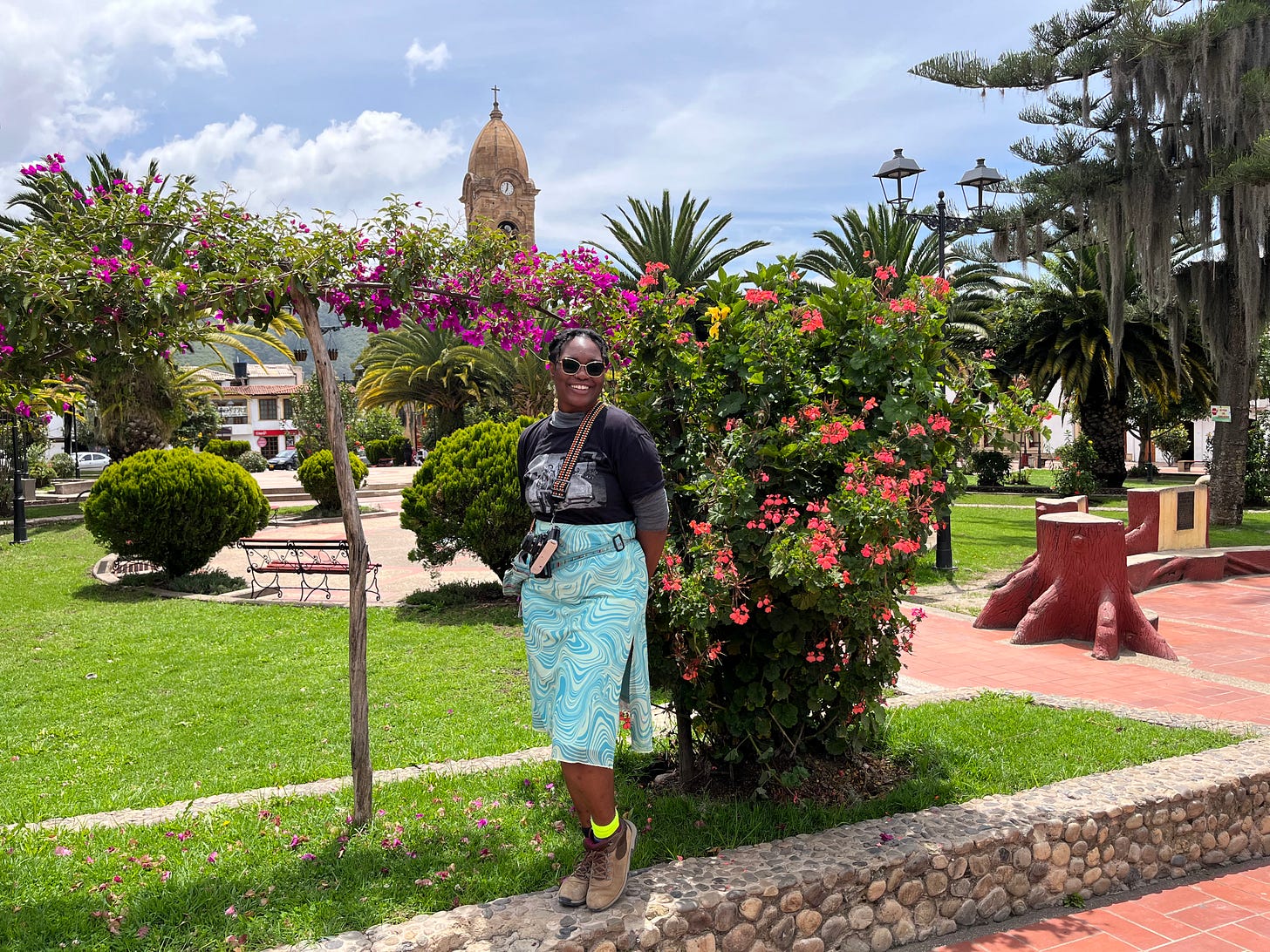
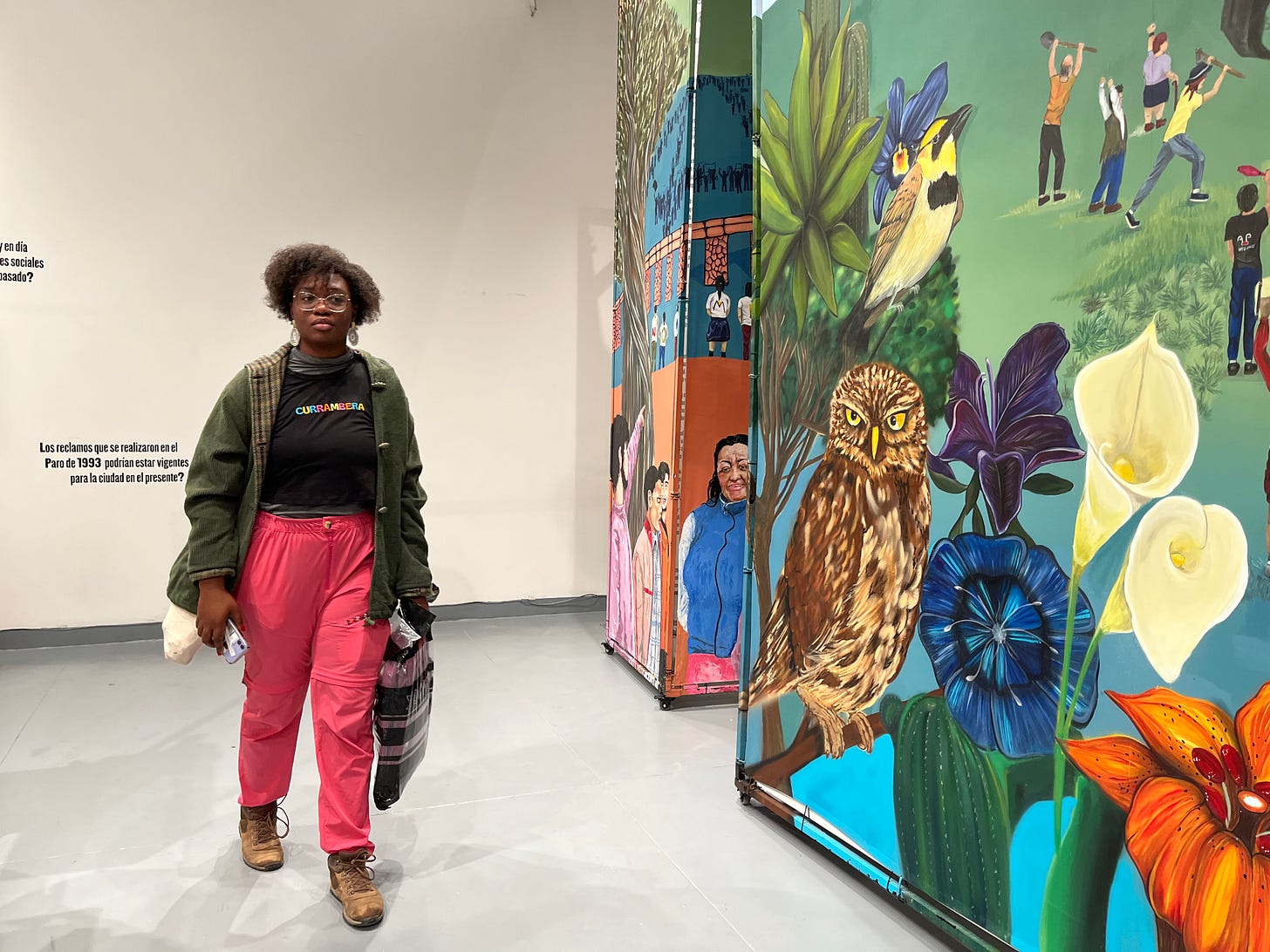
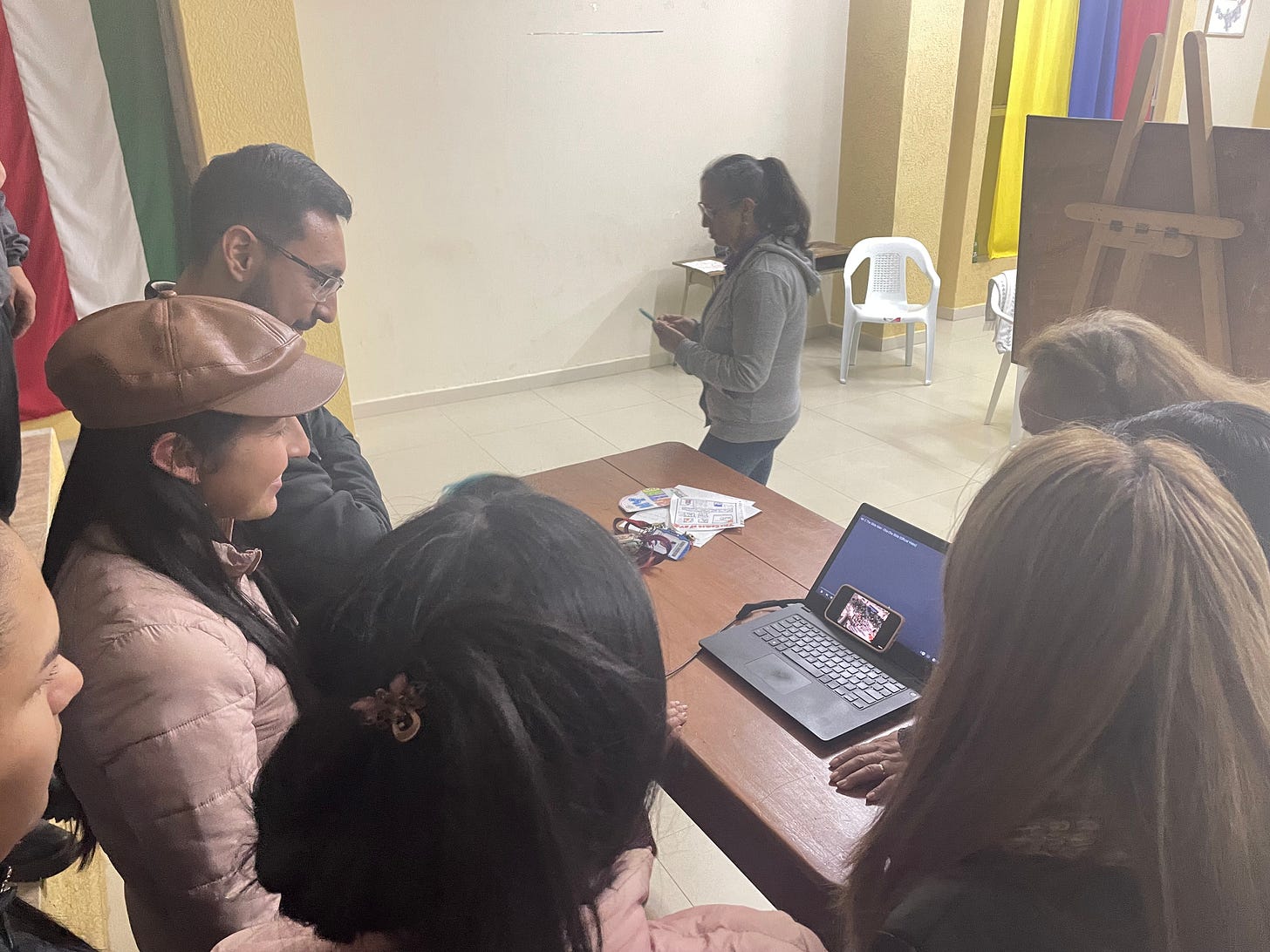
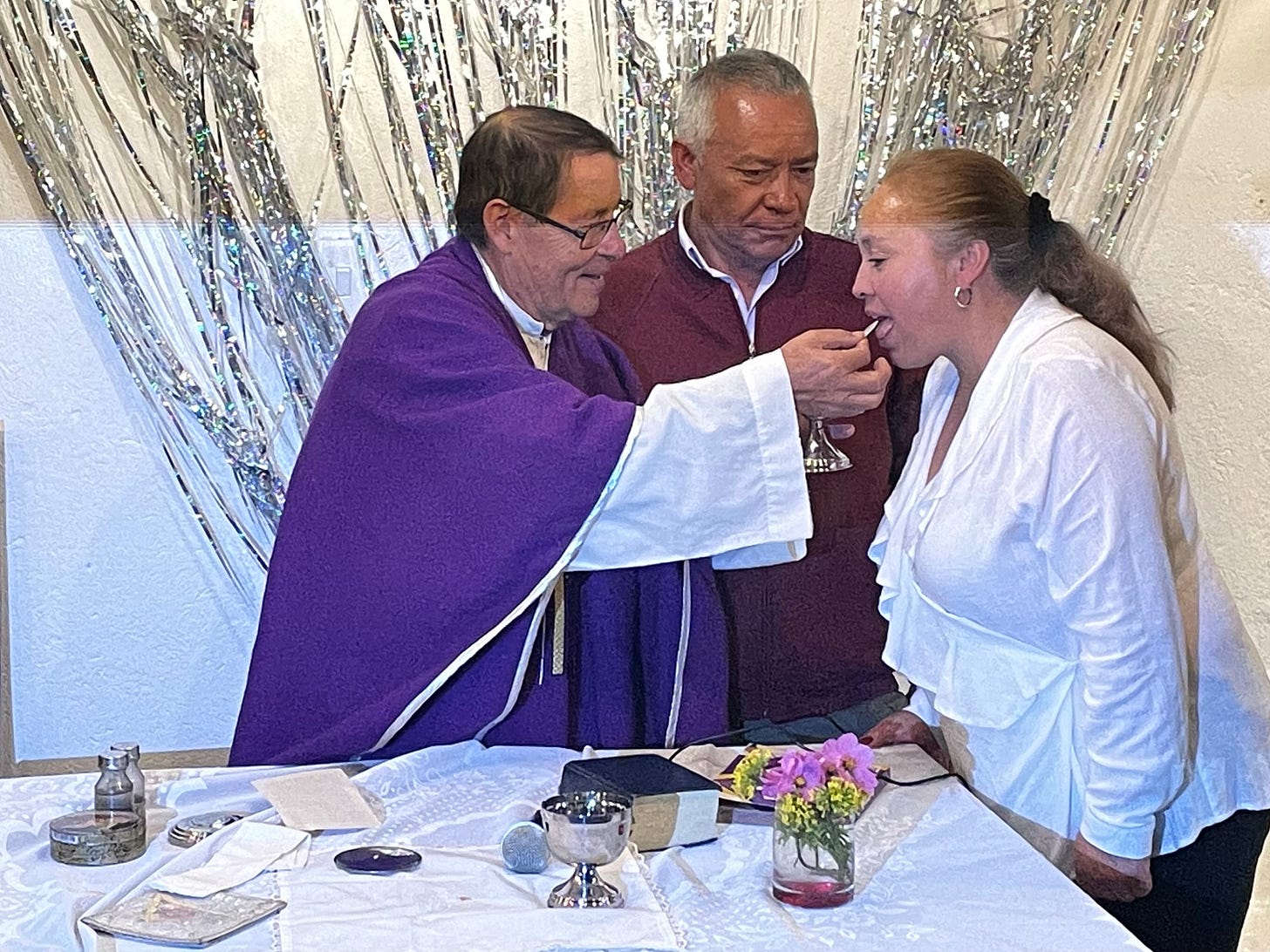
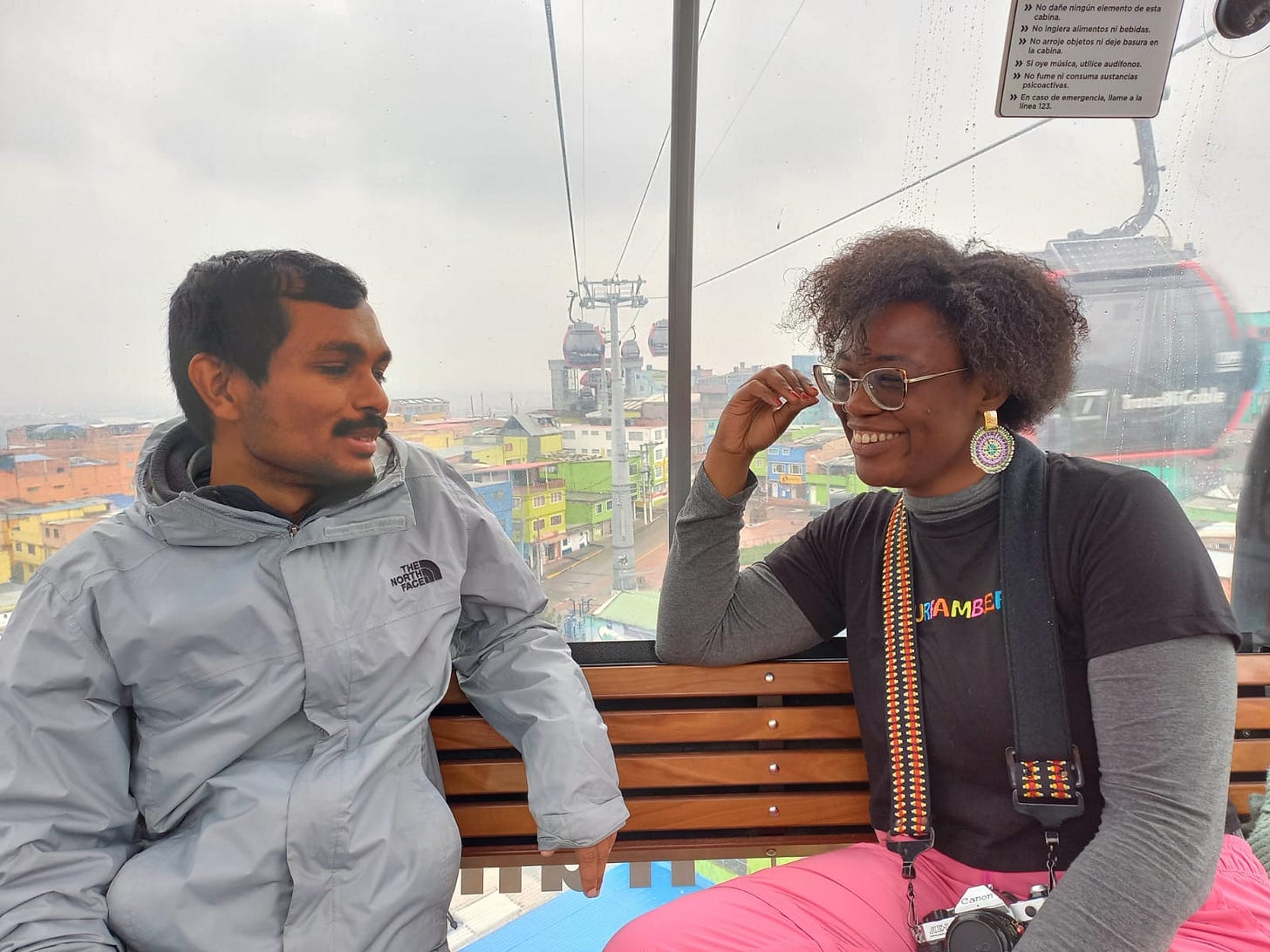

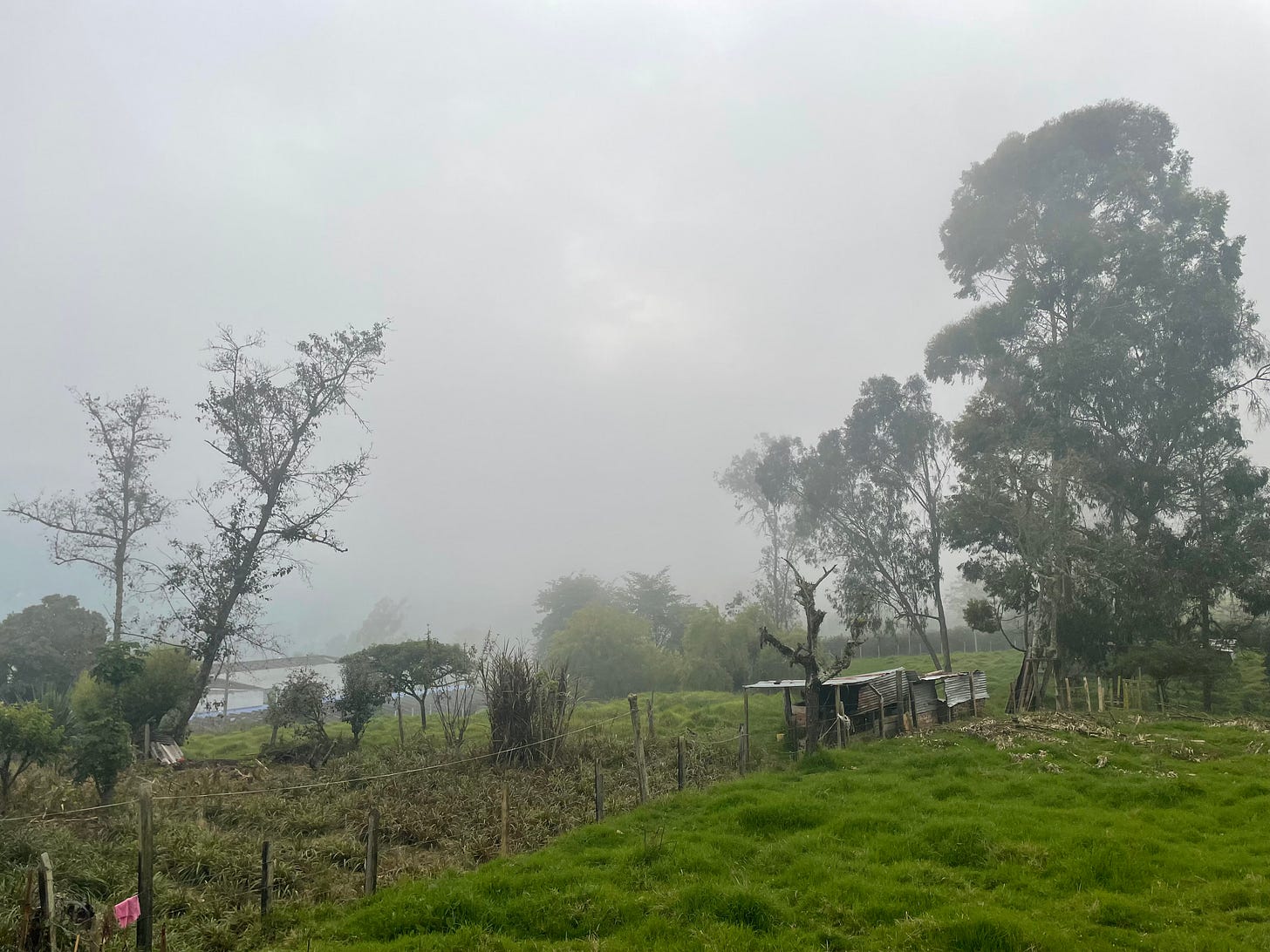

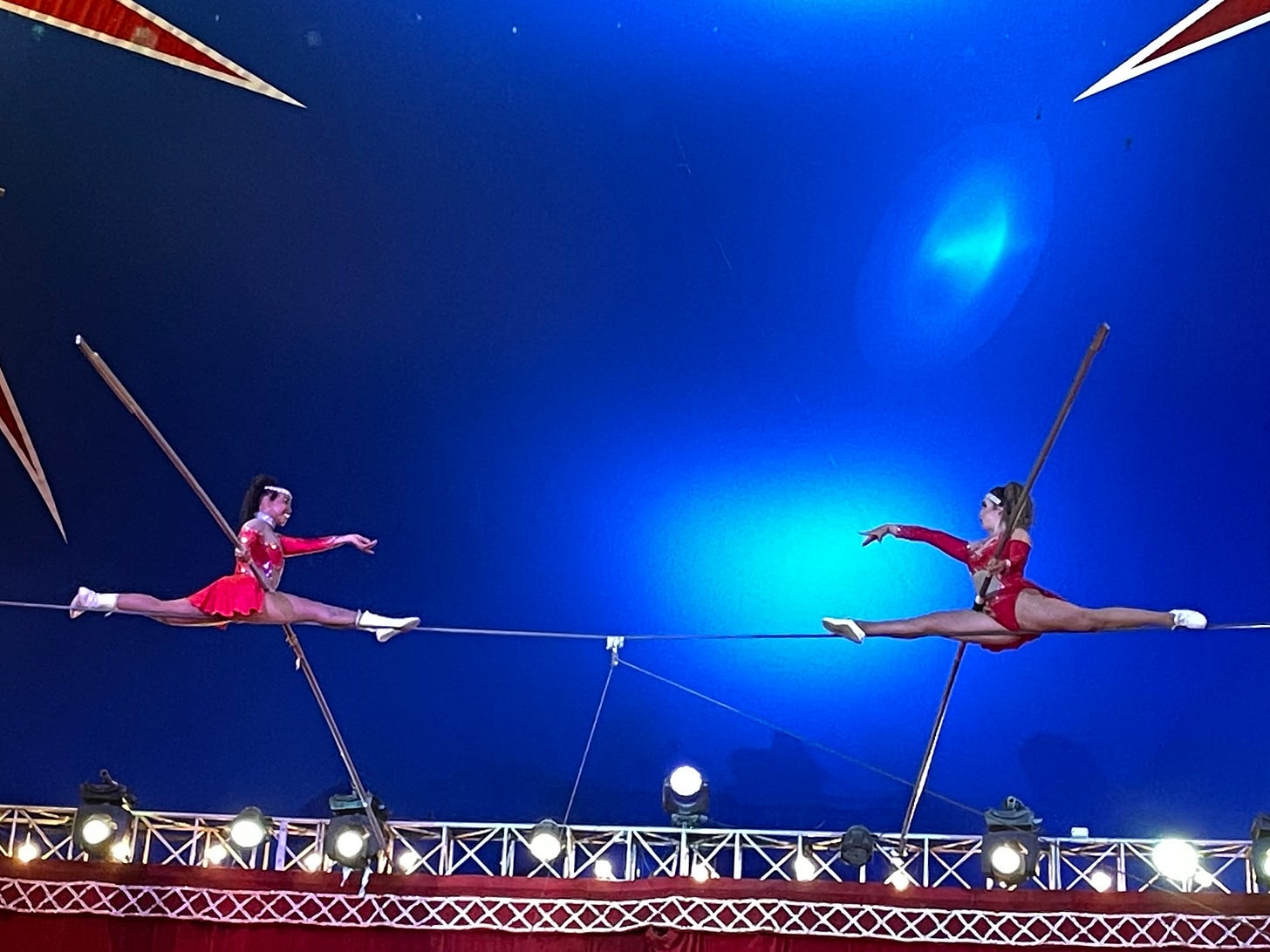
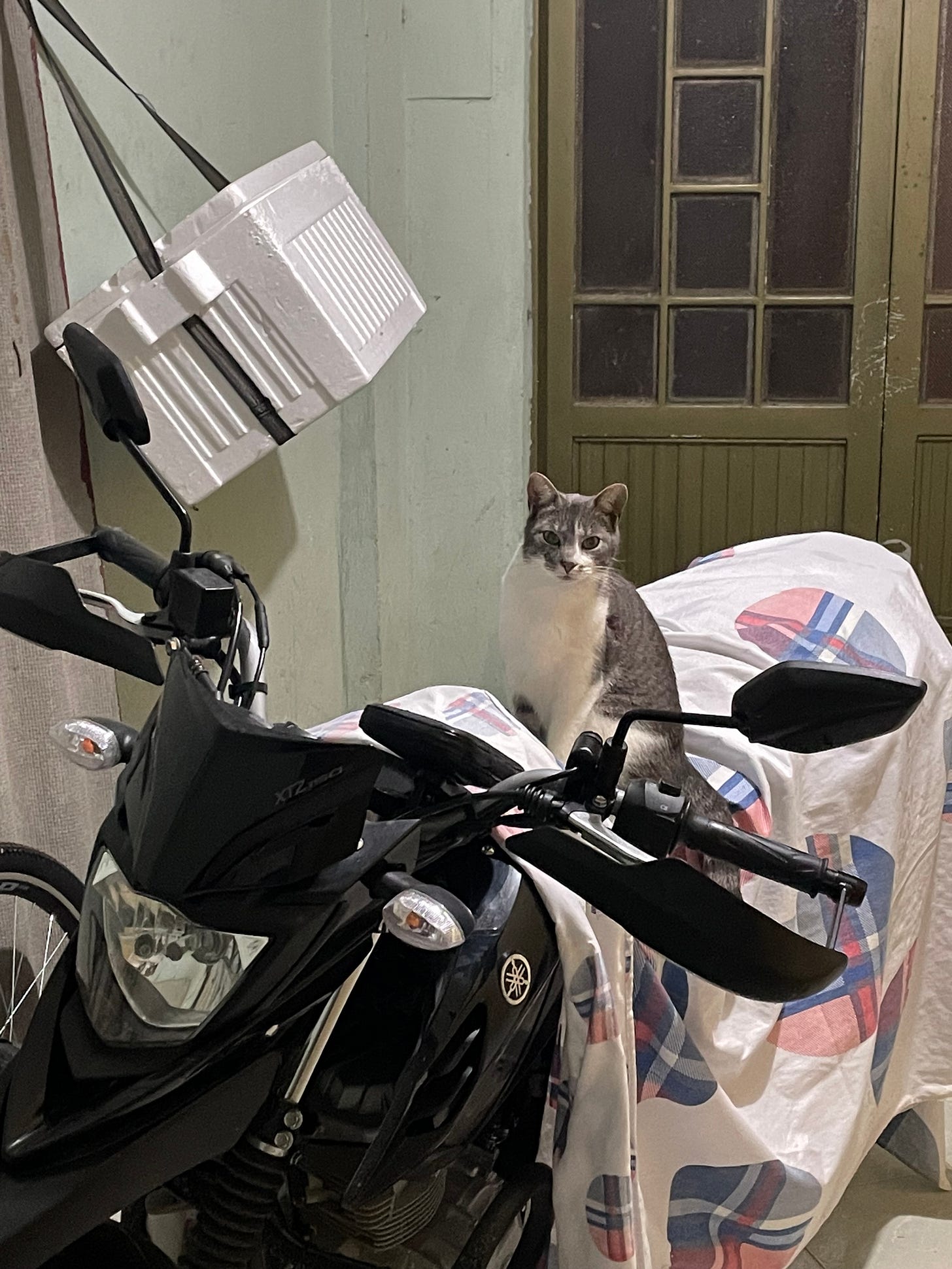
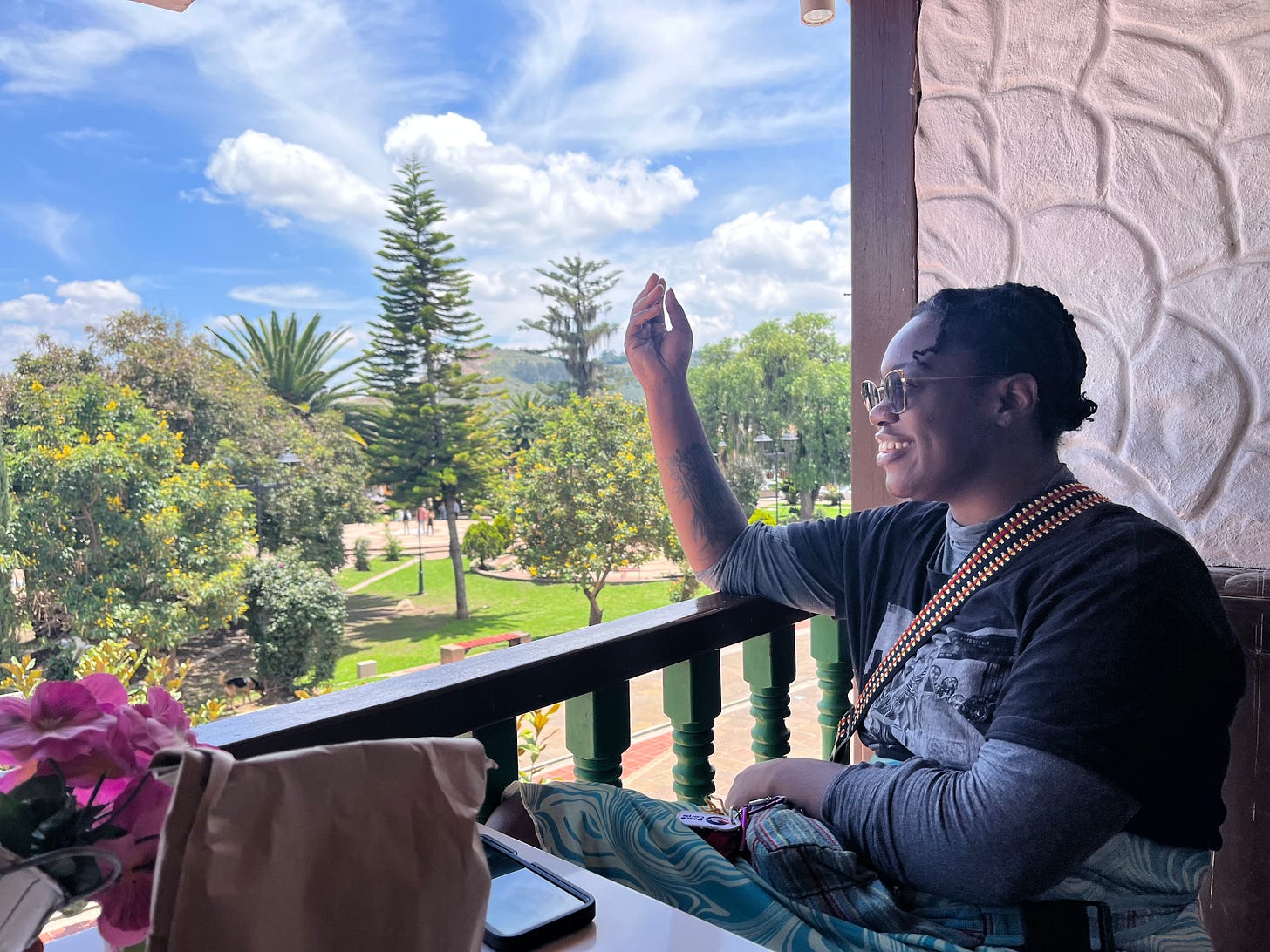
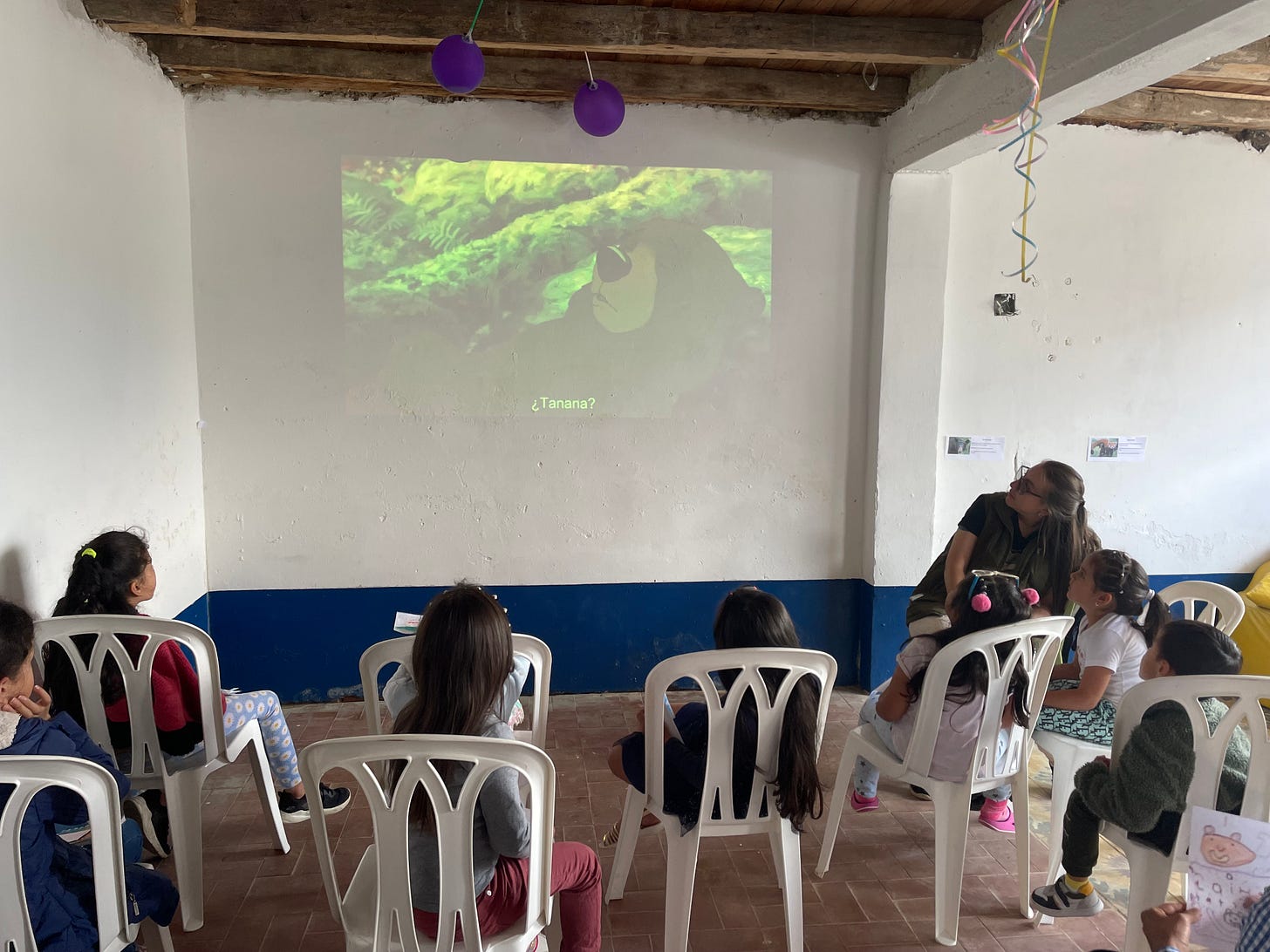
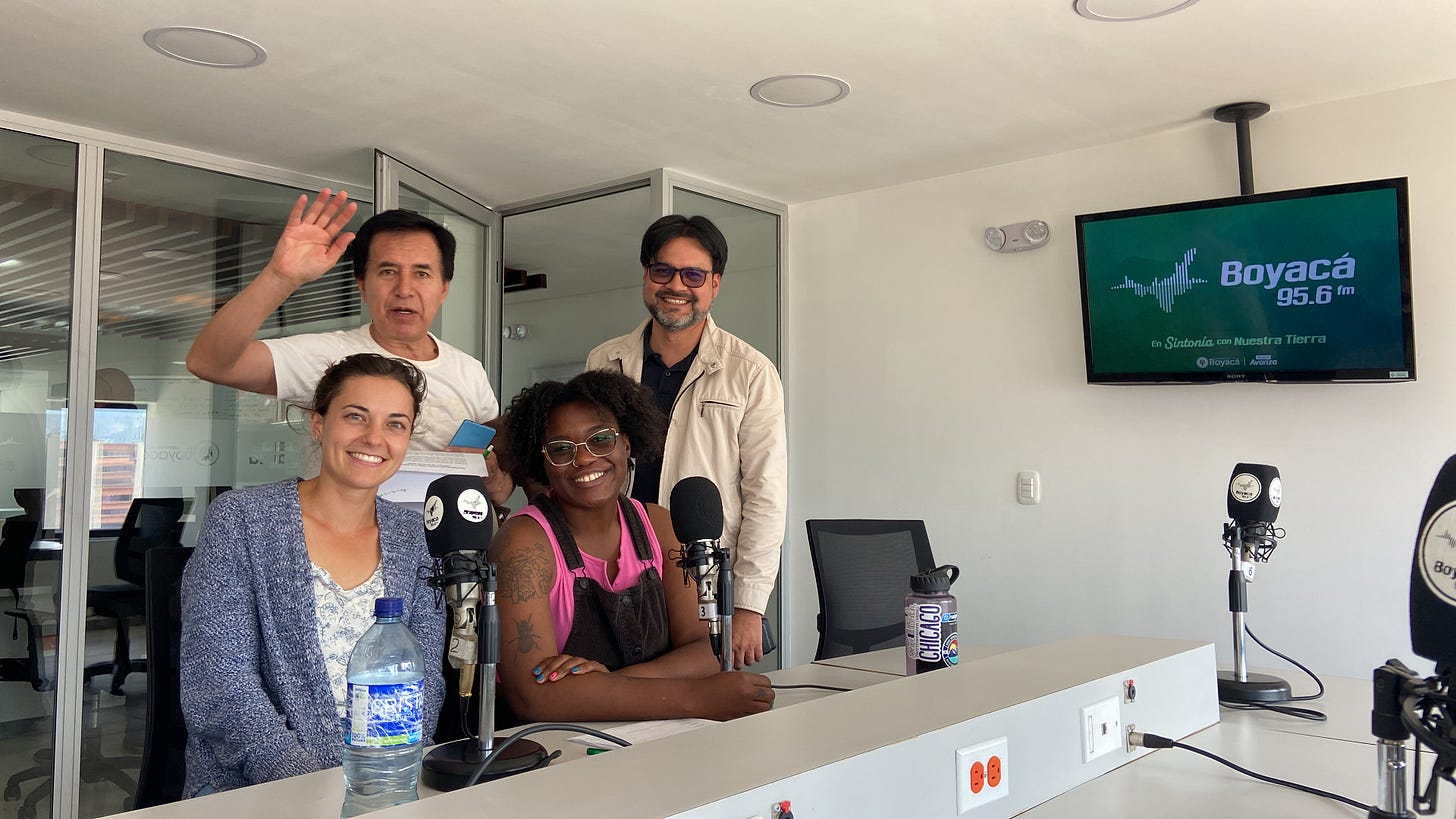

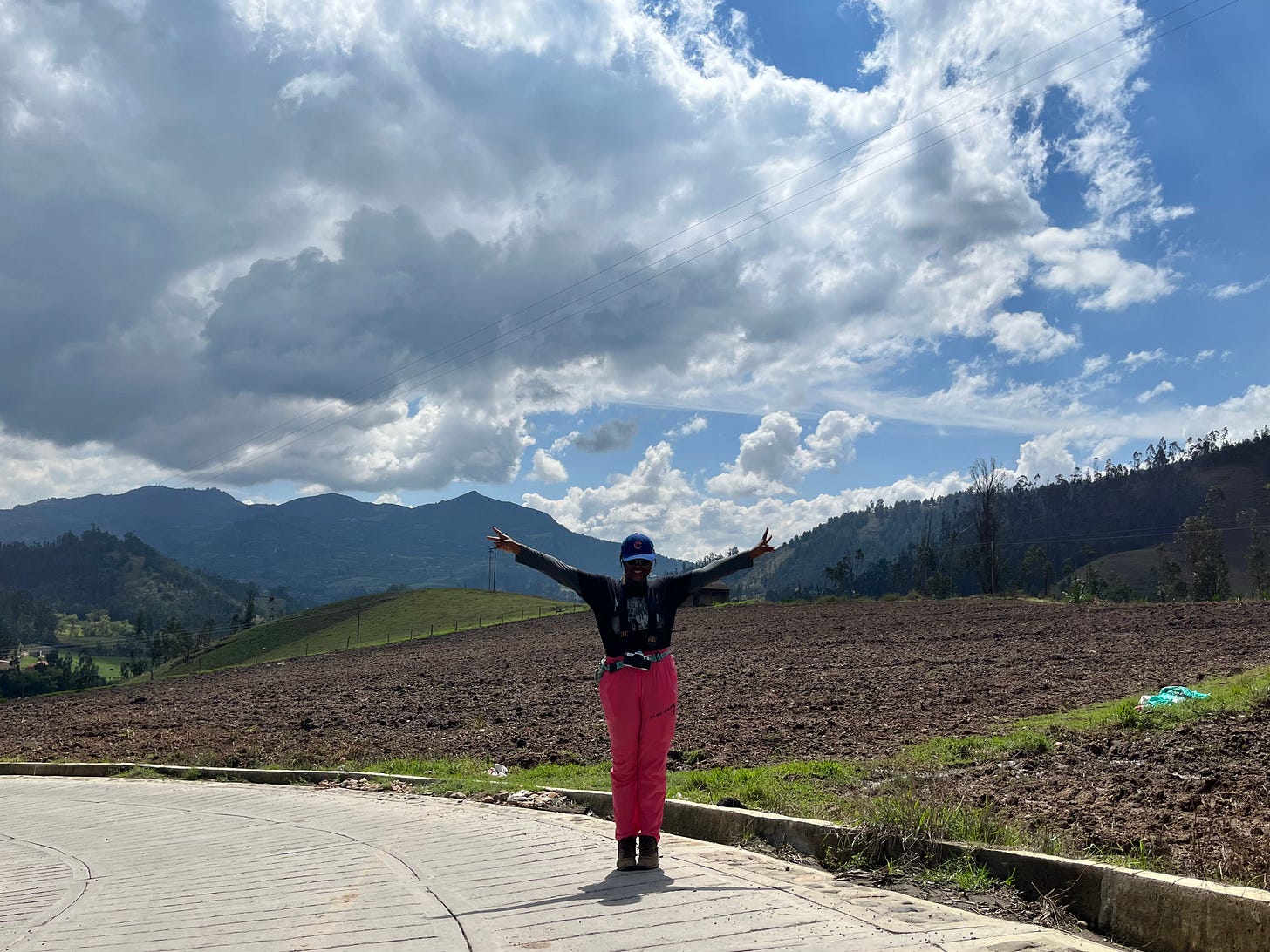
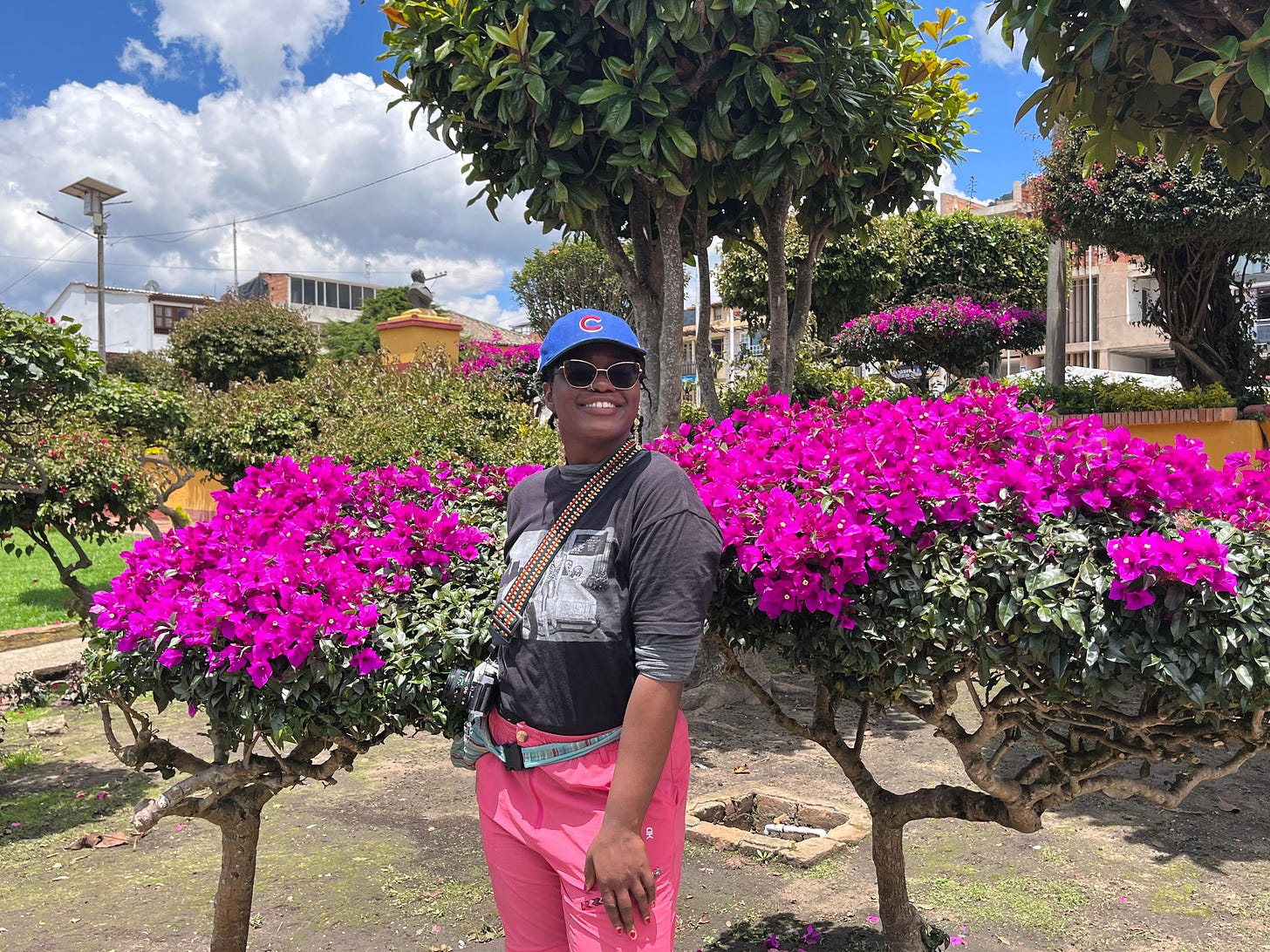
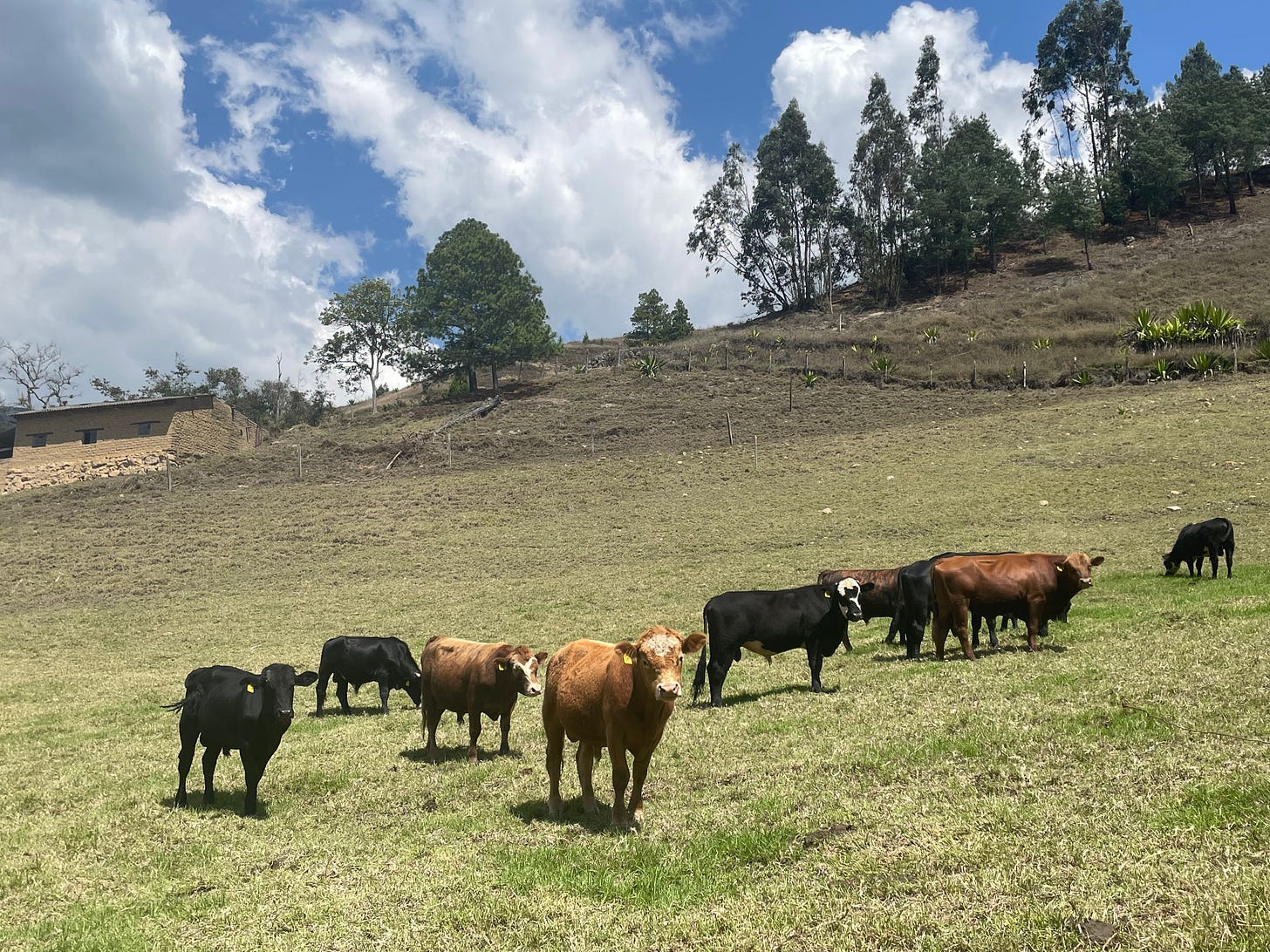
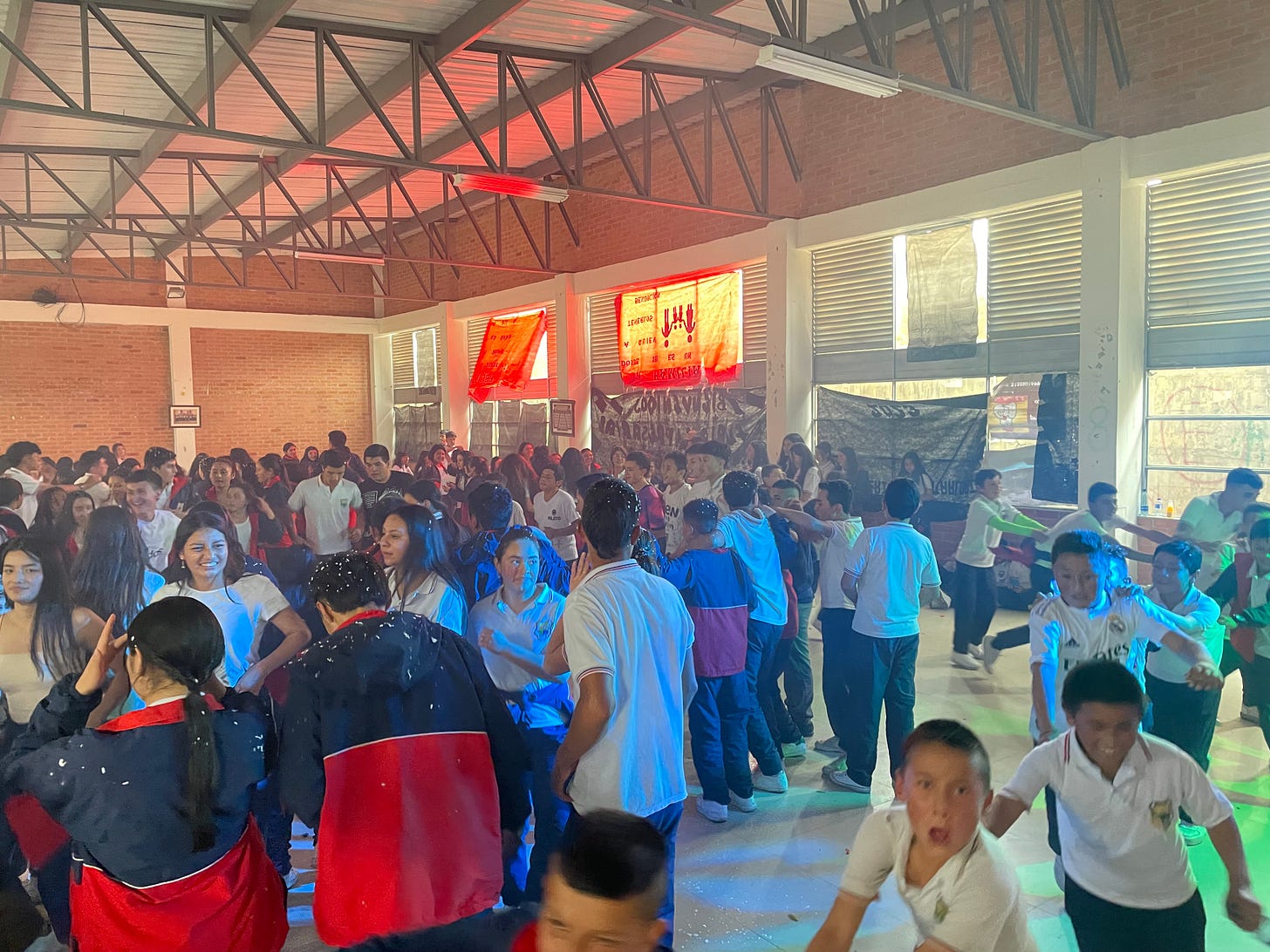
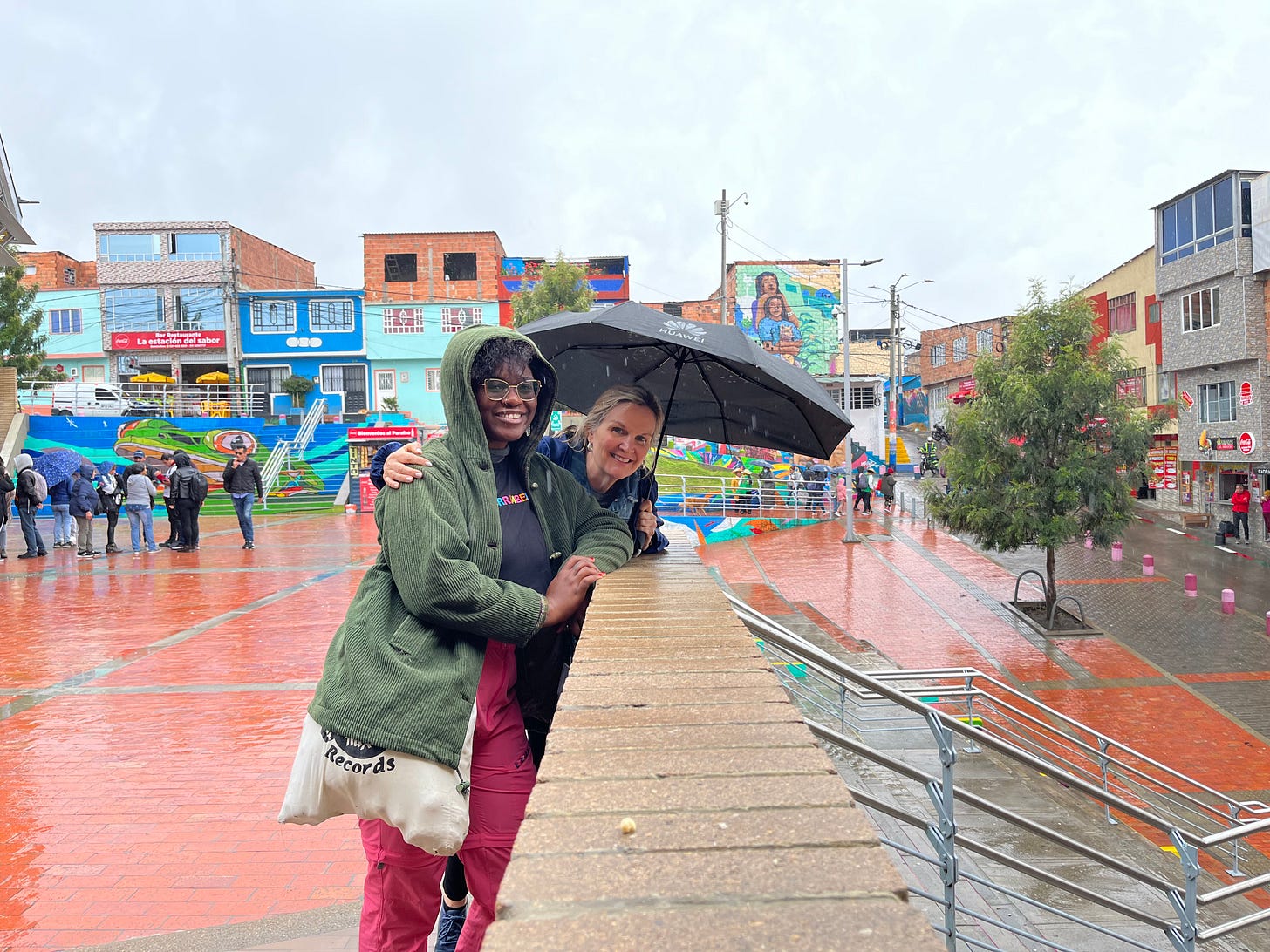
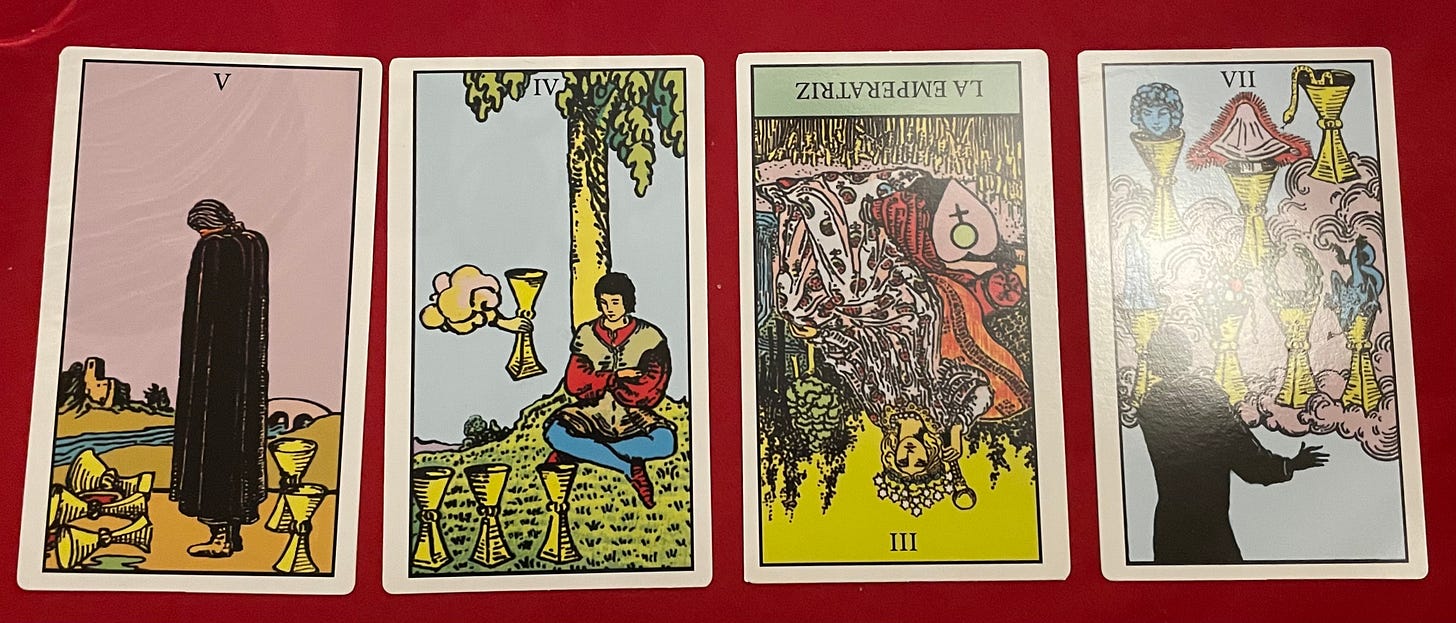
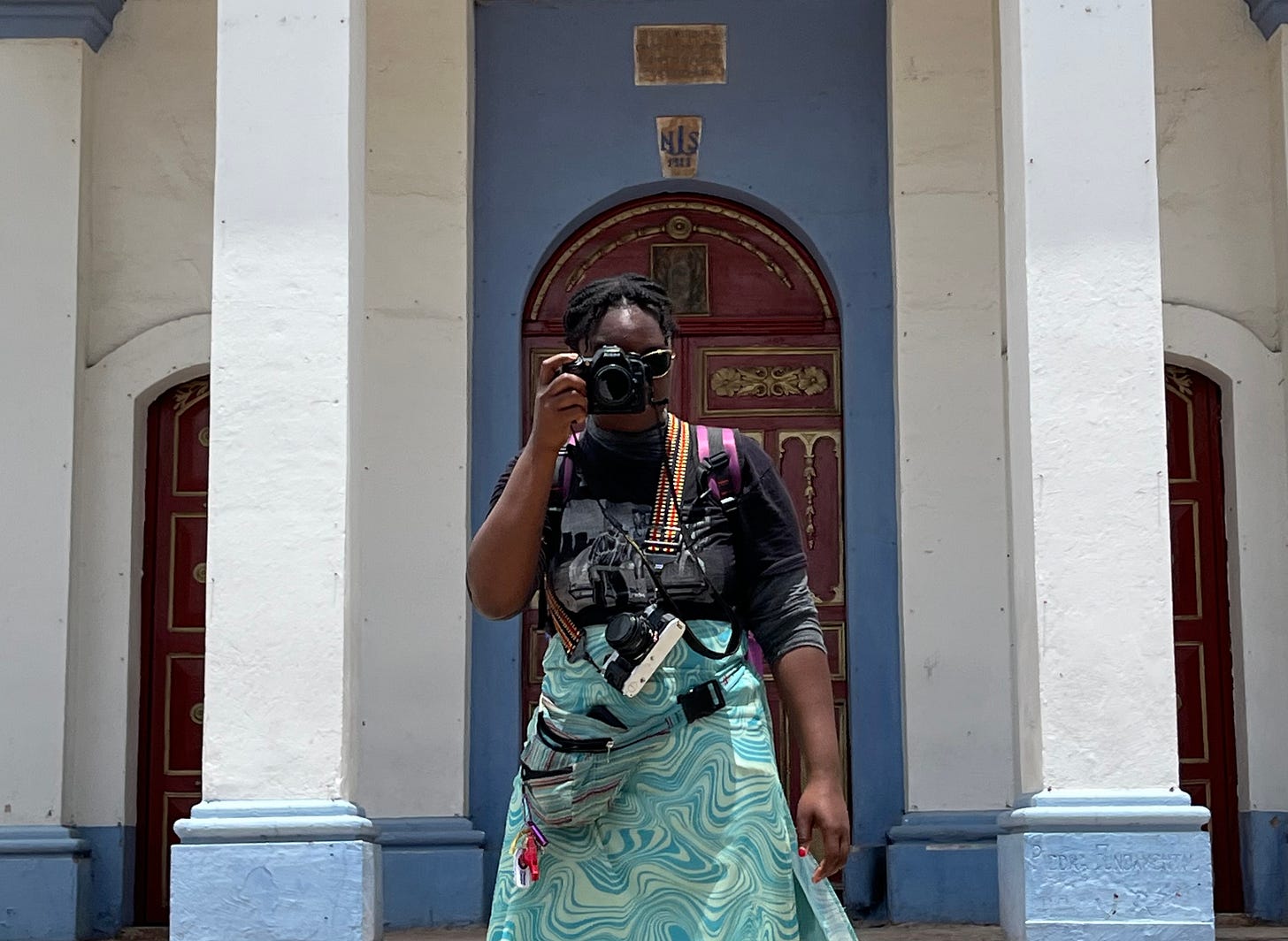
<3
grateful to hear your thoughts as always. final girl/final Black girl is such a smart frame. would do a lot for a hike where you talk ab homoeroticism in brekaing badw me!